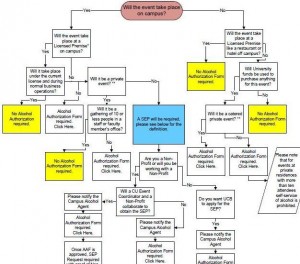(A version of this post was originally published on Pete’s blog).
Why does absurdity lead to humor?
Basically, somethings are so wrong that they spontaneously don’t seem real. BTW, here is the hilarious flowchart:
….
Learn more about the benign violation theory.
Check out Pete’s paper on psychological distance, which features work on hypotheticality:
Humor is ubiquitous and often beneficial, but the conditions that elicit it have been debated for millennia. We examine two factors that jointly influence perceptions of humor: the degree to which a stimulus is a violation (tragedy vs. mishap) and one’s perceived distance from the stimulus (far vs. close). Five studies show that tragedies (which feature severe violations) are more humorous when temporally, socially, hypothetically, or spatially distant, but that mishaps (which feature mild violations) are more humorous when psychologically close. Although prevailing theories of humor have difficulty explaining
the interaction between severity and distance revealed in these studies, our results are consistent with the proposal that humor occurs when a violation simultaneously seems benign. This benign-violation account suggests that distance facilitates humor in the case of tragedies by reducing threat, but that closeness facilitates humor in the case of mishaps by maintaining some sense of threat.
McGraw, A.P., Warren, C., Williams, L., & Leonard, B., (2012). Too close for comfort, or too far to care? Finding humor in distant tragedies and close mishaps. Psychological Science. 25, 1-9.


